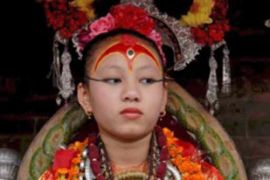Nepal king to miss Kumari blessing
Officials say monarch is likely to break with tradition and not attend festival.

Published On 24 Sep 2007
Sarbendra Khanal, the Kathmandu police chief, confirmed that security preparations had been made only for the prime minister.
“The arrangements made are for a visit by the prime minister. We have not heard any word from the king,” Khanal said.
Girija Prasad Koirala, the Nepali prime minister, who co-ordinated a peace deal with Maoist fighters that has put the country on the road to becoming a republic, was set to attend the ceremony in place of the king.
Koirala wants the king to abdicate and has already taken his place at three important religious festivals this year.
Living goddess
The Kumari is a pre-pubescent girl selected from a Buddhist community in Kathmandu valley and taken from her family to live in a palace in the centre of the capital’s ancient quarter.
|
“The person who has the power is the one who receives the Royal Kumari’s blessings. At the moment all the power belongs to the prime minister.” Chunda Bajracharya, |
She is worshipped as the living incarnation of a Hindu goddess, and her annual blessing is considered a spiritual seal of approval for the palace in the conservative Hindu-majority nation.
Chunda Bajracharya, a professor of cultural studies at Kathmandu’s Tribhuvan University, said: “The person who has the power [in Nepal] is the one who receives the Royal Kumari’s blessings. At the moment all the power belongs to the prime minister.”
A no-show at what is one of the country’s biggest festivals would be yet another blow to Nepal’s monarchy, which has been sidelined by the Maoists and mainstream parties after last November’s peace accord.
The king’s image been removed from new banknotes and coins, he has been ordered to pay tax and has had several of his palaces seized by the state.
The final status of the monarchy is to be decided after November elections to choose a body that will rewrite Nepal’s constitution.
The Maoists, however, quit the government last week and are pushing for the immediate abolition of what they term a “feudal” and “regressive” institution.
Gyanendra was crowned in 2001 after Birendra, the former king, and most of his family were massacred, according to the official version, by a drunken and drugged Dipendra, then crown prince, who in turn shot himself.
Source: News Agencies